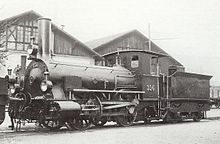locomotive
English

Etymology
2=mewPlease see Module:checkparams for help with this warning.
From French locomotive, from Latin locō (literally “from a place”) (ablative of locus (“place”)) + Vulgar Latin mōtivus (“moving”) (see motive).
Pronunciation
- Lua error in Module:parameters at line 376: Parameter 1 should be a valid language or etymology language code; the value "Gen" is not valid. See WT:LOL and WT:LOL/E. IPA(key): /ˌloʊkəˈmoʊtiv/
- Lua error in Module:parameters at line 376: Parameter 1 should be a valid language or etymology language code; the value "RP" is not valid. See WT:LOL and WT:LOL/E. IPA(key): /ˌləʊkəʊˈməʊtiv/
Audio (US): (file)
Noun
locomotive (plural locomotives)
- (rail transport) The power unit of a train that pulls the coaches or wagons.
- (rare) A traction engine
- (slang) A cheer characterized by a slow beginning and a progressive increase in speed
- (economics) A country which drives the world economy by having a high level of imports. (i.e. The United States).
Usage notes
Sometimes erroneously used as a synonym for train.
Synonyms
Derived terms
Terms derived from locomotive
Translations
self-propelled vehicle that runs on rails
|
Adjective
locomotive (comparative more locomotive, superlative most locomotive)
- of or relating to locomotion
- of or relating to the power unit of a train which does not carry passengers or freight itself
Translations
relating to locomotion
|
French
Pronunciation
Adjective
locomotive
Noun
locomotive f (plural locomotives)
Further reading
- “locomotive”, in Trésor de la langue française informatisé [Digitized Treasury of the French Language], 2012.
Italian
Noun
locomotive f
- plural of locomotiva
Categories:
- English terms derived from French
- English terms derived from Latin
- English terms derived from Vulgar Latin
- English 4-syllable words
- English terms with IPA pronunciation
- English terms with audio pronunciation
- English lemmas
- English nouns
- English countable nouns
- en:Rail transportation
- English terms with rare senses
- English slang
- en:Economics
- English adjectives
- French 4-syllable words
- French terms with IPA pronunciation
- French terms with audio pronunciation
- French terms with homophones
- French non-lemma forms
- French adjective forms
- French lemmas
- French nouns
- French countable nouns
- French feminine nouns
- Italian non-lemma forms
- Italian noun plural forms